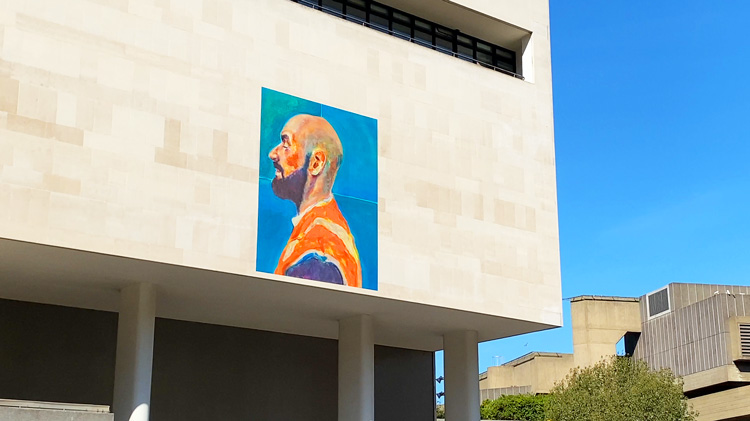
Ryan Mosley. My Brother Paul, 2020. Installation view, Everyday Heroes, Southbank Centre, London, 2020. Photo: Martin Kennedy.
Hayward Gallery, London
1 September – 1 November 2020
by EMILY SPICER
It took a global pandemic and a government-imposed lockdown for society to reassess who it values most. We came to realise very quickly that everything grinds to a halt without the delivery men and women, supermarket staff, transport workers and carers, who continued working, despite the risks to themselves. In recognition of this, the Southbank Centre has staged an outdoor exhibition of portraits and poetry on the walls of its buildings, celebrating our key workers.
Many of the artists exhibited have chosen to depict family members or friends. Ryan Mosley has painted a portrait of his brother, Paul, who is a train driver. This image is a departure for the Sheffield based artist, who usually paints surreal, folkloric images. Paul’s bright orange tabard contrasts with the blue tiles behind him as he sits in profile, like the subject of an early Renaissance Holbein. In fact, the image practically glows.
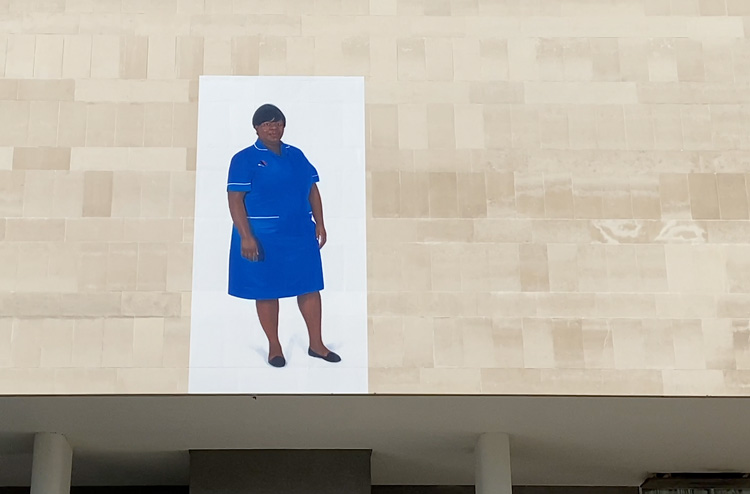
Alessandro Raho. Precious, 2020. Installation view, Everyday Heroes, Southbank Centre, London, 2020. Photo: Martin Kennedy.
It is similar in its sense of pride to a full-length portrait by artist Alessandro Raho, who painted Precious, a family friend and nurse who works in a hospital in Hastings, East Sussex. The accompanying text quotes Precious’s feelings about working in healthcare during a pandemic. “Being exposed to the virus was the biggest concern, along with how I would protect my family,” she said.
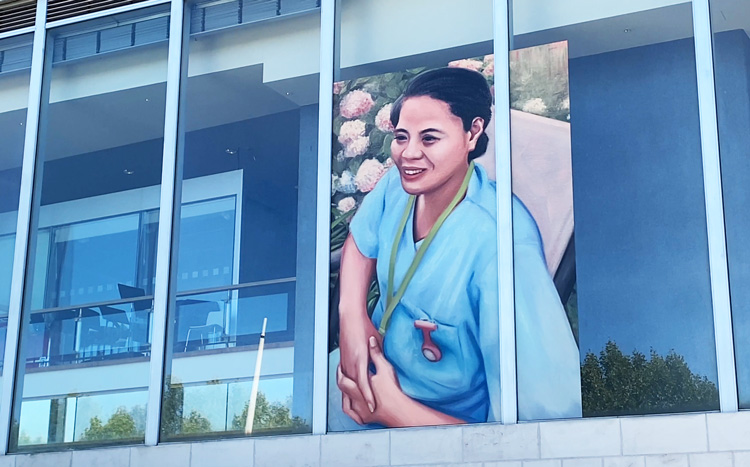
Lydia Blakeley. Jacqui, 2020. Installation view, Everyday Heroes, Southbank Centre, London, 2020. Photo: Martin Kennedy.
For reasons that are still not fully understood, ethnic minorities are at greater risk from Covid-19 than the white population. According to a report released in May by the Office of National Statistics, black females are 4.3 times more likely to die from the disease than their white counterparts. The figure is 4.2 for black males, and for those of Bangladeshi, Pakistani, Indian and mixed ethnicities there is a “statistically significant raised risk” of dying from the disease. This makes for grim reading, especially when you consider that 20% of NHS workers are from ethnic minority backgrounds.
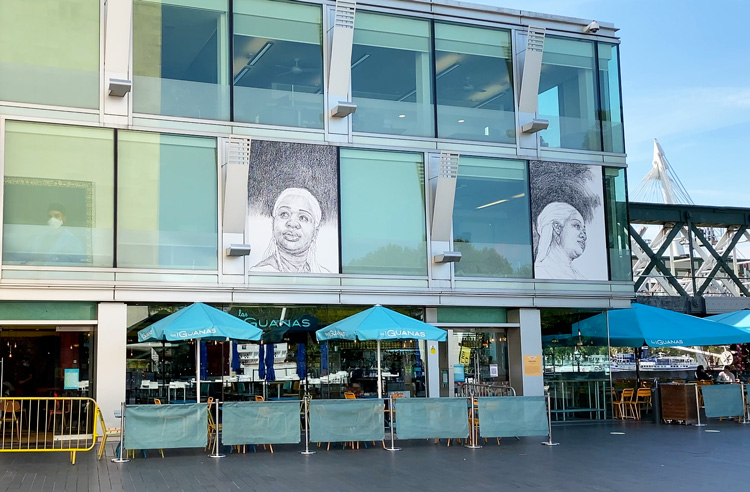
Barbara Walker. Rosemary I & II, 2020. Installation view, Everyday Heroes, Southbank Centre, London, 2020. Photo: Martin Kennedy.
Barbara Walker, who is known for making portraits that explore racial inequality, has included a triptych of drawings of her friend Rosemary, an NHS nurse. Walker depicts Rosemary in three poses, looking down, up and to the side, her face alert, strong and compassionate. “Frontline NHS staff are, of course, particularly vulnerable to coronavirus, and the susceptibility of ethnic minorities to the pandemic is sadly a matter of fact,” Walker says. “I am so proud of my friend, Rosemary. I am so proud of our NHS.”
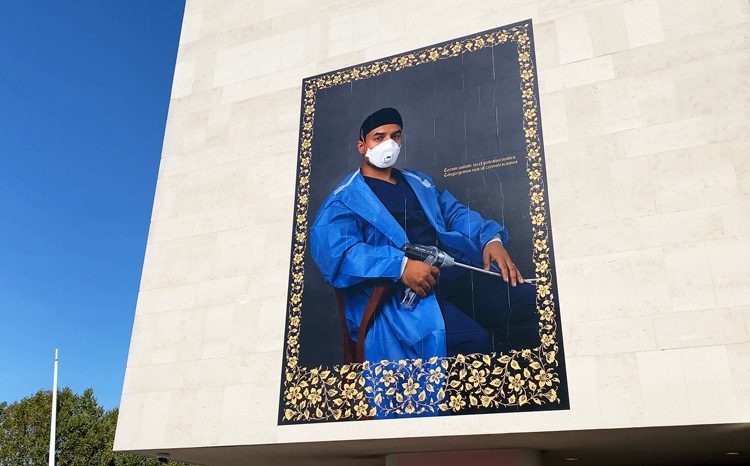
Mahtab Hussain. The Surgeon, 2020. Installation view, Everyday Heroes, Southbank Centre, London, 2020. Photo: Martin Kennedy.
Mahtab Hussain’s photo portraits transform NHS doctors into icons of our age. In one, an unnamed surgeon holds a stapler used for keyhole gastrointestinal surgery. His image is accompanied by the Latin words: Coram unitate iacet potestas nostra. Congregemus nos ut convalescamus (Our Power Lies in Unity. We are gathered to gain strength).
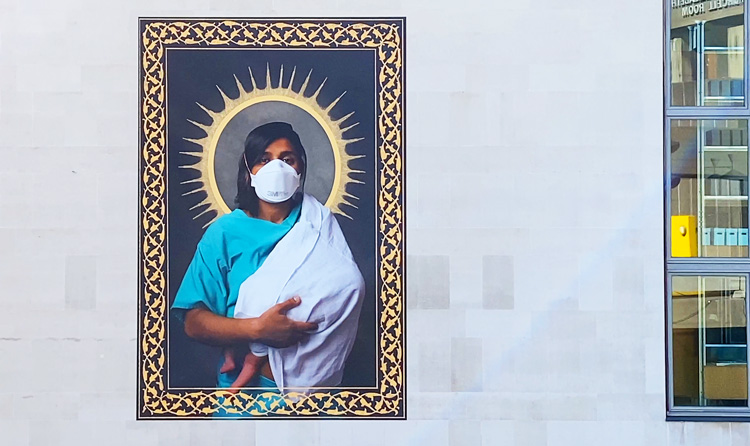
Mahtab Hussain. Dr A Shahid with Ember, 2020. Installation view, Everyday Heroes, Southbank Centre, London, 2020. Photo: Martin Kennedy.
Hussain’s second portrait is of Dr A Shahid, a dermatologist and friend of the artist. She worked during lockdown while heavily pregnant and is pictured here, dressed in her scrubs, holding her newborn child in white swaddling cloth. She looks like a Christian saint, but the golden border, which incorporates a fish motif, references Mughal miniature paintings.
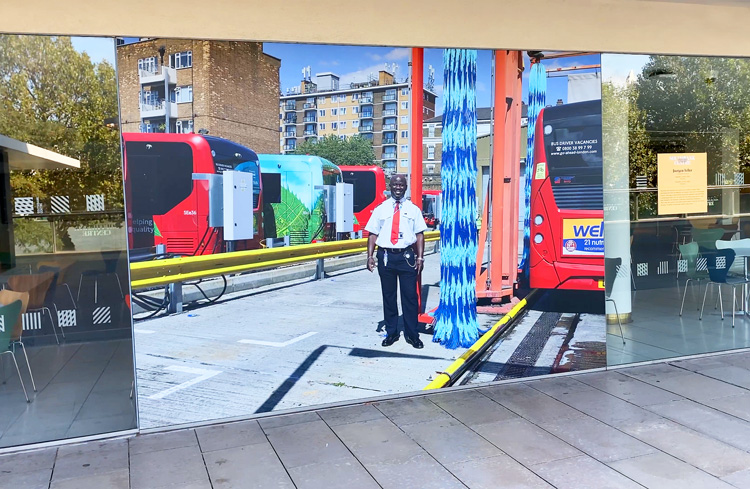
Juergen Teller. Stephen, London, 2020 Installation view, Everyday Heroes, Southbank Centre, London, 2020. Photo: Martin Kennedy.
It is, of course, not just NHS staff who are at greater risk from Covid-19. Those working on public transport are also more vulnerable to exposure to the disease. Juergen Teller has contributed portraits of two London bus drivers, Natasha and Stephen. Unfortunately, these images have none of Teller’s usual flair and are, to be frank, a little unimaginative. Still, they serve to remind us of the importance of those who keep London moving under lockdown.
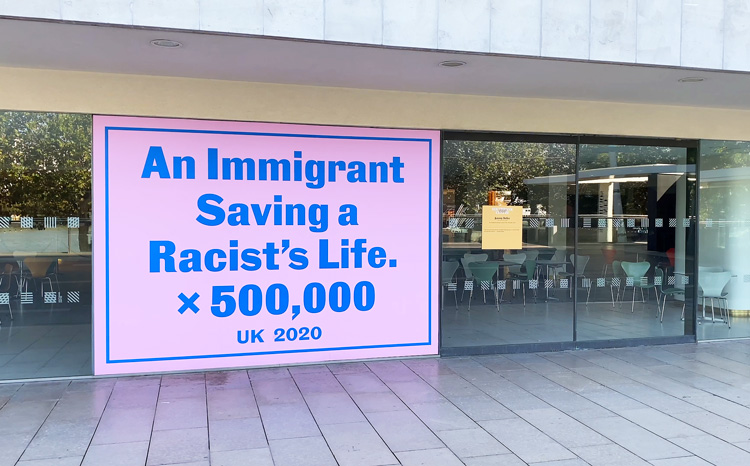
Jeremy Deller. An Immigrant Saving a Racist’s Life x 500,000, 2020. Installation view, Everyday Heroes, Southbank Centre, London, 2020. Photo: Martin Kennedy.
Many of the artists in this exhibition have deviated from their usual ways of working, perhaps because the situation is so strange and still ongoing. Carrying on as normal, even artistically, might seem an inadequate response. Jeremy Deller simply includes the words “An Immigrant Saving a Racist’s Life. x 500,000. UK 2020’’ printed in blue on a pink background. It is not a nuanced message, but conveys some manner of reality.
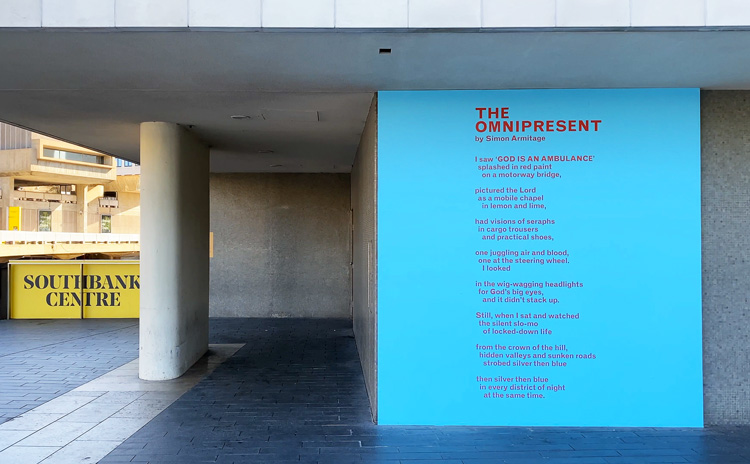
Simon Armitage. Omnipresent. Installation view, Everyday Heroes, Southbank Centre, London, 2020. Photo: Martin Kennedy.
This exhibition lightly scratches the surface of race and social inequality in pandemic Britain, while politely offering up cheerful and hopeful imagery. It is not a gritty portrayal of the situation we find ourselves in, or the sacrifices made by numerous keyworkers. The Southbank is an upbeat, cheerful sort of place, after all, and the news channels have provided enough doom and gloom for a lifetime. The poetry on offer varies in tone, but does have a little more bite. The opening lines of Jackie Kay’s poem reads: “You find yourself doing the missing for them- / the ones you look after as your own.” Sometimes words have more resonance than images.
While the art here is distilled and shiny, and would not feel out of place at the BP Portrait Award, there are two images that quietly celebrate the day-to-day most of us experience, the quiet strangeness of lockdown. Silvia Rosi’s black-and-white images of her family in London convey a determined resolve to carry on with life’s routines. In one photograph, Rosi’s brother lies on his stomach with a book, his face gently lit by the light of his phone. The accompanying text tells us that he struggles with his studies because of dyslexia and hyperactivity, but here Rosi has captured him in a moment of concentration, as he perseveres with distance learning.
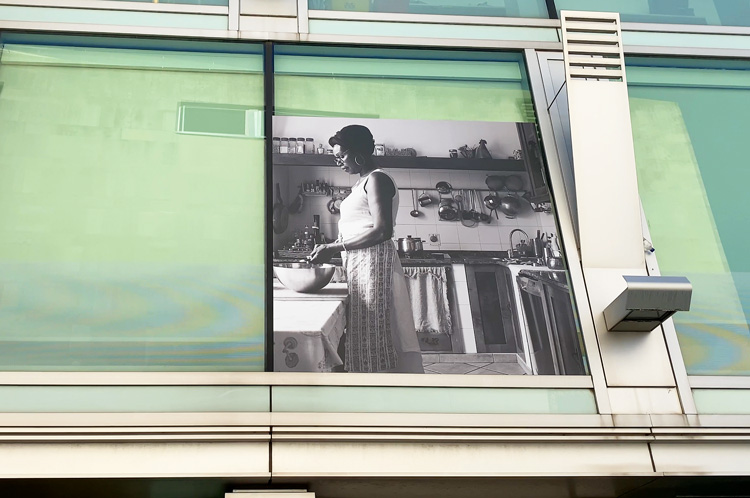
Silvia Rosi. Portrait of my mother during isolation, 2020. Installation view, Everyday Heroes, Southbank Centre, London, 2020. Photo: Martin Kennedy.
Meanwhile, Rosi’s mother prepares dinner in a neat, well-ordered kitchen, perhaps representing the mothers, fathers, brothers, sisters and partners quietly holding everything together, while the outside world seems chaotic and turbulent. A model of poise and strength, she reminds us that sometimes heroes reside at home.
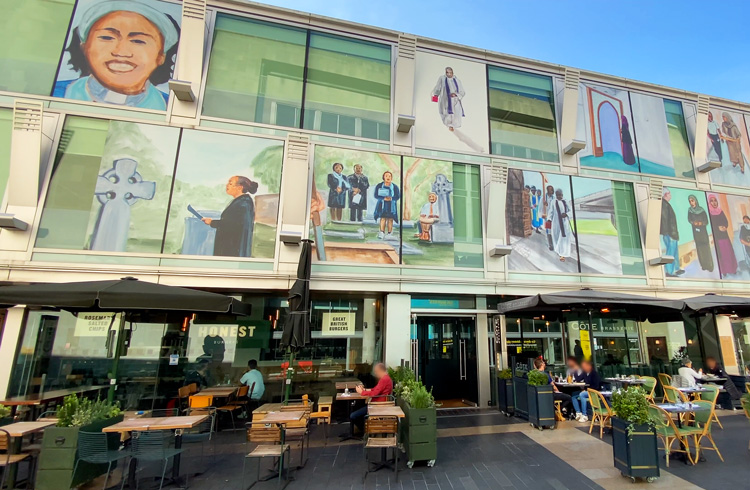
Matthew Krishanu. Portraits of four female religious workers who, along with other religious workers across the country, continued to find ways to serve their community throughout the crisis. The subjects are Rehanah Sadiq, a Muslim chaplain for two Birmingham NHS hospital trusts; Eve Pitts, Britain’s first black female Church of England vicar; Margaret Jacobi, a rabbi at a progressive Jewish synagogue; and Deseta Davis, a pastor and prison chaplain. Installation view, Everyday Heroes, Southbank Centre, London, 2020. Photo: Martin Kennedy.